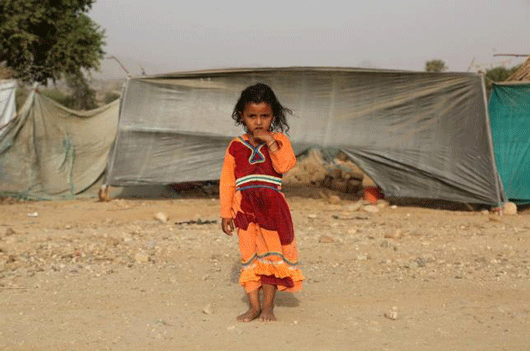
By James Jeffrey
Using a scrunched up piece of tissue between her fingers, 20-year-old Gada dabs at her eyes between the slit in her black niqab face veil. After more than a minute’s silence it is obvious she can’t conjure words to answer the question: how bad was it in Yemen before you left?
During 2015, escalation of fighting in Yemen led to a mass exodus, with thousands fleeing to Djibouti on the opposite side of the 30km stretch of water known as Bab-el-Mandeb, meaning the Gateway of Tears - based on the long history of people perishing when trying to cross it - and which is the southern entrance to the Red Sea.
Many settled in a refugee camp outside the small town of Obock, an inhospitable sun-blistered corner of the Horn of Africa. There, an American Catholic missionary has single-handedly run a school and education courses for Yemeni children and young adults.
"Education is obviously important, and the school gives parents a much-needed break from their kids in the cramped camp, but this is more to do with showing the refugees that they matter and have a future - that they’re not left out," says Marianne Vecchione, a Los Angeles resident who has spent the past year in Obock.
This endeavour has included bringing to Djibouti City, the country’s capital on the other side of the Gulf of Tadjoura, eight students to take primary school exams so they can progress to high school, and 12 students to take exams for their high-school completion certificates so they can progress to university.
"We lived next to a military camp," says Issa, another student taking exams to finish grade 12 but who is unsure whether he’ll be able to use the high-school completion certificate in Yemen. "My future used to be in Yemen when I had a father with an income. But if we go back we’ll be starting from scratch. Before, we depended on ourselves, but how do we do that now?"
Between exams, the students live and study in a ramshackle apartment on the edge of Djibouti City’s African quarter, the poorer side of town.
"I try not to visit the apartment too much as, if the locals see me, there’s a good chance they’ll increase the rent," Vecchione says.
She’s operating on a tight budget. Though she was able to get funds for the school in the camp - about $5,000 from Caritas Canada, a Catholic relief, development and social service organization, and about $8,000 from the United Nations Children’s Emergency Fund - she had to raise about $1,000 from family and friends to take students to the city for their exams.
Good example
Djibouti’s government comes in for a fair share of criticism for overseeing a mushrooming economy derived from its expanding port network, while little apparently trickles down to help large numbers of unemployed and impoverished people. But Vecchione notes how its ministry of education has co-operated fully with her and helped facilitate the students’ exams.
"The government does have challenges, but they are showing the way internationally [with refugees]," says Tom Kelly, US ambassador to Djibouti. "They’ve saved thousands of lives. It deserves credit for opening its borders to people who had nowhere else to go."
Having completed exams, the students returned to Obock and the drudgery of camp life, especially during the Ramadan fast, with daily temperatures of 38 degrees and above. During long torpid days with nothing to do, there’s plenty of time to reflect.
"There’s nothing like home," says Dina (44), who went to Djibouti City as a female chaperone for the four female students, including Gada, taking the grade-12 exam.
"Even if you are somewhere better, you can’t compare with it - where you had your childhood, the traditions, the parks, the mosques and culture. We miss everything, the breath and waves of Yemen. We even miss the shopkeepers, as that meant daily life."
At the height of the exodus, the camp was crammed with 3,000 refugees, though now 1,000 remain. Many have returned to Yemen or managed to move to Djibouti City or elsewhere. Some of those remaining in the camp don’t hold out much hope for a return to Yemen.
"When will there be peace? Maybe in 30 years if the old generation dies and the young are more peaceful and loving," says one 45-year-old Yemeni who, back in Yemen, is head of a tribe and didn’t want his name to be used due to his position.
...
Source: Irish Times, Edited by Website Team